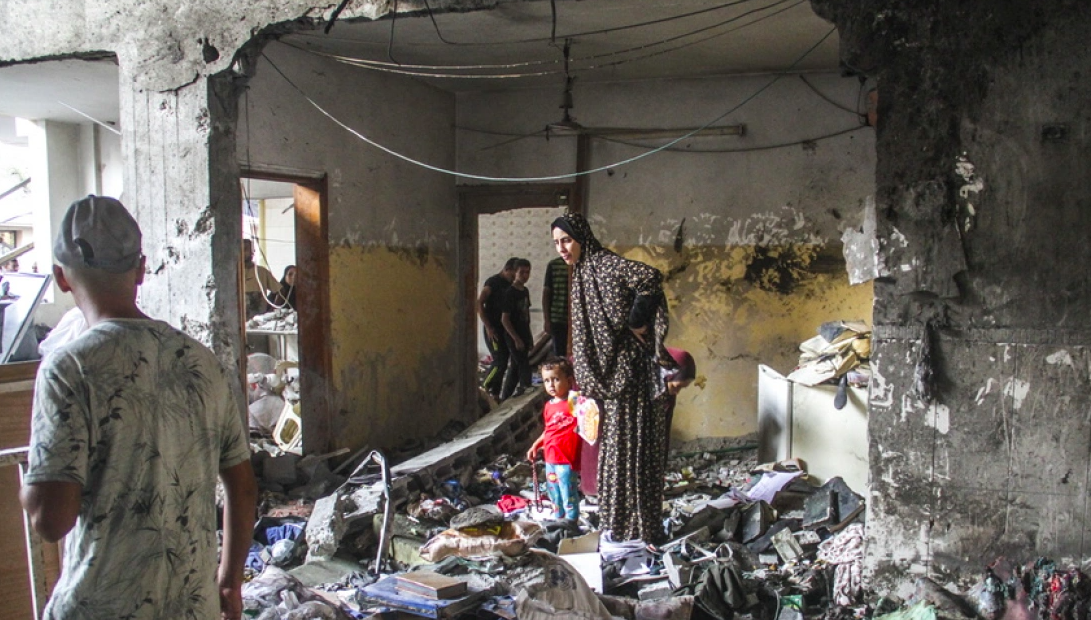France, Germany, and the United Kingdom stated today that “there can be no further delay” in conducting negotiations for a ceasefire in Gaza, warning “Iran and its allies” against any “new escalation” of the conflict.
“The fighting must stop immediately, and all hostages still held by Hamas must be released,” the leaders of these three countries said in a joint statement, reiterating the call from their counterparts in the US, Egypt, and Qatar “for the immediate resumption of negotiations.”
Eight months after the Hamas attack that killed 1,198 people on October 7, Israel’s retaliatory assault has resulted in at least 39,790 deaths in Gaza, where 111 hostages are still being held—39 of whom are reported dead, according to the Israeli army.
“We agree that no further deadline can be given,” the European leaders added, expressing “deep concern about the worsening tensions in the region.”
The conflict has indeed taken on a new dimension following the assassinations at the end of July of the Lebanese Hezbollah military chief Fouad Sukkar near Beirut and, more notably, of Hamas leader Ismail Haniyeh in Tehran. The Iranian regime has claimed it has “the right to punish” Israel for this action carried out on its soil—an act for which Israel has not taken responsibility.
However, for Paris, London, and Berlin, “no country or nation stands to gain from a new escalation in the Middle East.”
The three European capitals have urged “Iran and its allies to refrain from attacks that further exacerbate regional tensions and endanger the ability to achieve a ceasefire and the release of hostages.”
Hamas Calls for Implementation of Biden’s Plan
On Sunday, Hamas called for the implementation of a plan presented by US President Joe Biden in late May for a ceasefire in the Gaza Strip, rather than “conducting further negotiations,” as residents were mass evacuating from Khan Younis in the southern part of the Palestinian enclave, where new Israeli ground and air operations were expected.
This request from the Palestinian Islamist movement came the day after an airstrike on a school, one of the deadliest since the start of the war on October 7, triggered by an unprecedented Hamas assault on southern areas of Israeli territory.
Despite persistent international calls for a ceasefire, mediation efforts by countries such as Qatar, Egypt, and the US have repeatedly failed in recent months.
On May 31, President Biden presented a plan, which he described as an Israeli proposal, that initially called for a six-week ceasefire, accompanied by the withdrawal of Israeli troops from densely populated areas of Gaza and the release of Israeli hostages in exchange for the release of Palestinian prisoners.
Hamas has called on mediating countries to “present a roadmap” for the “implementation” of Biden’s plan based on the presentation by President Biden and “the decision of the UN Security Council,” rather than engaging in “further negotiations” or presenting “new proposals.”
A few days ago, the mediating countries called for the resumption of indirect negotiations on August 15 to declare a ceasefire in the Gaza Strip, accompanied by the release of Israeli hostages held in the enclave and Palestinians detained in Israeli prisons. Israel has announced it will participate; Hamas has not yet clarified its position.
In Gaza, the Israeli army early Sunday called on civilians to urgently evacuate Al-Jalaa, a northern neighborhood of Khan Younis, where it has already conducted repeated operations.
The army reported that Hamas had installed “terrorist infrastructure” there and was “preparing” to launch attacks.
“We can’t take it anymore; we’ve been displaced fifty times,” lamented Saleh Gaban as she left with few belongings.
In Gaza City, rescue teams continued their work the day after an airstrike that killed 93 Palestinians, including women and children, at a school building converted into a shelter for displaced persons, provoking international outrage.
“We will need another two days to identify the dismembered bodies,” said Mahmoud Bashal, a civil protection spokesperson.
The Israeli army assured that the school building housed a “command center” from which Hamas and Palestinian Islamic Jihad fighters “conducted attacks” against its members and that it had “eliminated” at least “19 terrorists.”
Israel has vowed to eradicate Hamas, which has ruled the Gaza Strip since 2007 and is classified as a terrorist organization by the US and the EU, following its attack on southern areas of Israeli territory on October 7, which resulted in 1,198 deaths, mostly civilians, according to a tally by the French Press Agency based on official Israeli data. Of the 251 people abducted that day, 111 are still being held hostage in Gaza, with 39 believed to be dead, according to the Israeli army.
In the extensive Israeli retaliatory operations in Gaza, at least 39,790 people have been killed so far, according to the Hamas government’s Health Ministry.
Israeli troops frequently return to areas where they had previously conducted operations and withdrawn, as Palestinian fighters reappear. On Sunday, Khan Younis was bombarded once again.
As footage captured by AFP photographers shows, many Palestinians went to Nasser Hospital following the bombardment, bringing bodies and bloodied wounded.
In recent days, more than 75,000 people have been forced to flee to the southwestern part of the small area, according to the UN agency for Palestinian refugees (UNRWA).
Other areas in the central and northern parts of the besieged Palestinian enclave were also bombarded overnight. At least two people were killed, according to the Palestinian Red Crescent.
The threat of military escalation remains in the region, where opponents of Israel have opened various fronts, notably Hezbollah in Lebanon, which has exchanged fire daily with Israeli forces along the border for over ten months.
US Secretary of Defense Lloyd Austin has ordered the USS Abraham Lincoln aircraft carrier and its escort ships to expedite their arrival in the region, the Pentagon announced yesterday.
The retired general also ordered the deployment of the nuclear-powered submarine USS Georgia equipped with cruise missiles to the region.
Meanwhile, Hezbollah announced that three of its fighters were killed in Israeli strikes in southern Lebanon, two of them yesterday. Israeli forces reported hitting the infrastructure of the Iran-aligned Lebanese movement.
The situation has become even more volatile following the assassination of Hamas leader Ismail Haniyeh in Tehran on July 31—a move attributed to Israel—and the death on July 30 of a leading member of Hezbollah’s military wing, Fouad Sukkar, in a bombing in a southern suburb of Beirut confirmed by the Israeli army.
Iran and its allies have threatened Israel with “severe” retaliation for these deaths.
In the occupied West Bank, where tensions have further escalated since the outbreak of the war in October, the Israeli army reported that an Israeli citizen, around twenty years old, was killed in an attack by “terrorists” in vehicles, prompting a manhunt.
Palestinian Authority President Mahmoud Abbas, based in Ramallah in the West Bank, is expected to begin a visit to Russia today, where he is scheduled to meet with President Vladimir Putin.
Ask me anything
Explore related questions





